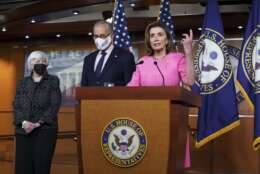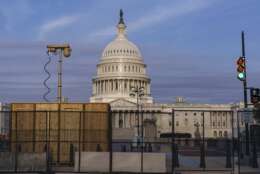Government Shutdown
-
The debt ceiling is looming closer and the government shutdown is only a couple of weeks away. And the mask mandate continues to roil Congress.
November 22, 2021 -
No, there hasn't been much progress on several pressing issues, including a need to secure full-year agency funding and avert (another) government shutdown, a deal with the debt ceiling (again) and a whole host of other legislative work.
October 25, 2021 -
Members of Congress agreed to reauthorize the Highway Trust Fund that funds several DOT agencies during a vote on Saturday. But that's about all they got done.
October 04, 2021 -
Federal employment attorney Heidi Burakiewicz represents tens of thousands of employees who sued for damages after both the 2013 and 2018 shutdowns, and joined Federal Drive with Tom Temin to bring us up to speed on those cases.
October 01, 2021 -
With only hours to spare, President Joe Biden has signed legislation to avoid a partial federal shutdown and keep the government funded through Dec. 3
September 30, 2021 -
Federal contractors are drawing on the lessons they learned from the last partial lapse in appropriations, a 35-day event companies say has changed the way they prepare for a possible government shutdown later this week.
September 29, 2021 -
The federal contracting community will feel relieved if Congress proceeds with a continuing resolution, and avoids a lapse in appropriations. Fondly known as a government shutdown.
September 28, 2021 -
One of the big differences between government and the private sector is the field of labor relations. In industry, it is usually disgruntled workers who go out on strike.
September 28, 2021 -
Republican senators have blocked a bill to keep the U.S. government funded and allow borrowing
September 27, 2021 -
You need a scorecard for the legislative shenanigans going on on Capitol Hill this week.
September 27, 2021 -
The government shutdown deadline is right around the corner. The good news? Congress has learned a few things from the last shutdown, bringing the tiniest bit of certainty to feds with their back pay and health insurance the next time it happens again.
September 27, 2021 -
It's customary for the Office of Management and Budget to engage with agencies on planning seven days before any government shutdown deadline. OMB said it's confident Congress will avoid a lapse in appropriations before next Thursday's deadline, although it's unclear what path lawmakers will take to do so.
September 23, 2021 -
While members of Congress and the White House are using the threat of a shutdown to win a budgetary or political victory, the pawns are you.
September 23, 2021 -
The House passed a nine-week continuing resolution Tuesday night, which would sustain agency operations through Dec. 3. But the CR also temporarily suspends the debt limit through December 2022, a measure Republicans have said they're unwilling to support.
September 21, 2021 -
Besides fighting over a $3.5 trillion extra spending bill and a $2.9 trillion tax hike, there's the matter of the regular old appropriations to keep the government running.
September 20, 2021













